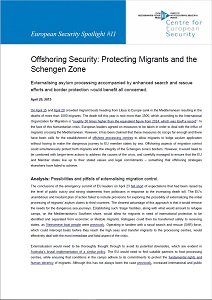Offshoring Security: Protecting Migrants and the Schengen Zone - Externalising asylum processing accompanied by enhanced search and rescue efforts and border protection would benefit all concerned.
Offshoring Security: Protecting Migrants and the Schengen Zone - Externalising asylum processing accompanied by enhanced search and rescue efforts and border protection would benefit all concerned.
Author(s): Markéta Wittichová, Benjamin Tallis
Subject(s): International relations/trade, Security and defense, Asylum, Refugees, Migration as Policy-fields
Published by: Ústav mezinárodních vztahů
Keywords: offshoring; security; migrants; Schengen zone;
Summary/Abstract: On April 15 and April 20 crowded migrant boats heading from Libya to Europe sank in the Mediterranean resulting in the deaths of more than 1000 migrants. The death toll this year is now more than 1500, which according to the International Organization for Migration is “roughly 30 times higher than the equivalent figure from 2014, which was itself a record”. In the face of this humanitarian crisis, European leaders agreed on measures to be taken in order to deal with the influx of migrants crossing the Mediterranean. However, it has been claimed that these measures do not go far enough and there have been calls for the establishment of offshore processing centres to allow migrants to lodge asylum application without having to make the dangerous journey to EU member states by sea. Offshoring aspects of migration control could simultaneously protect both migrants and the integrity of the Schengen zone’s borders. However, it would need to be combined with longer-term actions to address the causes of the crisis, and carefully managed to ensure that the EU and Member states live up to their stated values and legal commitments – something that offshoring strategies elsewhere have failed to achieve.
Series: European Security Spotlight
- Page Count: 2
- Publication Year: 2015
- Language: English
- Content File-PDF

